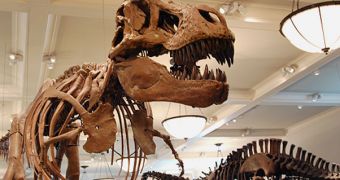According to a new set of pieces of evidence, it may be that the asteroid that is thought to have hit our planet more than 65 million years ago, extinguishing most dinosaur species, did not cause widespread fires, as first thought. The data seems to suggest that the impact simply caused our planet's surface to broil steadily and over many years. The new investigation answers a number of questions related to the previous theory, which had it that the Earth's forests caught fire from debris falling into the atmosphere.
There are a large number of problems with that, one of them being that the geological layers around the world do not contain enough soot to correspond to global wildfires. Additionally, a number of plant species did survive. This doesn't make sense, namely that only some plants endured, as everything around them was in flames. Current knowledge has it that a ten-kilometer asteroid impacted our planet, most likely in Mexico, and caused the Cretaceous–Tertiary extinction event.
Now, two researchers bring new evidence that the widespread-fire hypothesis does not stand. They say that, immediately following an asteroid impact, a large amount of pieces of debris was ejected into space, or in the higher atmosphere, and that it started falling back on the surface shortly afterwards. Computer models show that reentering objects would heat the Earth to 260 degrees Celsius for at least 20 minutes, allowing for wood to catch fire. But experts Tamara Goldin, from the University of Vienna, and Jay Melosh, from the Purdue University, say that something else happened.
They argue that, as the first amounts of debris started reentering the atmosphere, they themselves created a protective layer for the vegetation underneath. “The actual ejecta themselves were getting in the way of the thermal radiation [in the atmosphere] and shielding the Earth,” Goldin says, quoted by NewScientist. The conclusion was drawn from the team's studies of how the debris might have affected the heat transfer from the outer layers of the atmosphere back to the surface. The two also say that an ensuing impact winter, followed by acid rain-rich global warming periods might have finally made all the species disappear, but not immediately.

 14 DAY TRIAL //
14 DAY TRIAL //